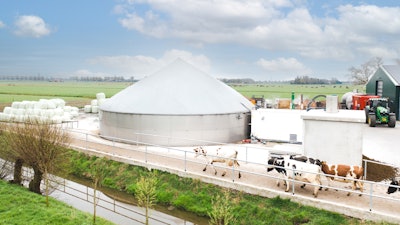
BURLINGTON, Vt. — Ben & Jerry's is making a bold commitment to bring greenhouse gas emissions on 15 dairy farms to half the industry average by the end of 2024.
Once proven, pilot project initiatives will be expanded to farms across Ben & Jerry's global dairy supply chain.
"This approach to dairy farming could be a game changer," said Jenna Evans, global sustainability manager for Ben & Jerry's. "It has the potential to make a meaningful reduction in emissions on dairy farms and help fight the worst effects of climate change. All of us, especially businesses, must take action before it's too late and the climate crisis makes our world uninhabitable."
Dairy ingredients account for more than 50% of Ben & Jerry's total greenhouse gas emissions, so the company is focusing on dairy farms as the best opportunity to reduce its carbon footprint. "Project Mootopia," as the pilot has been dubbed, will use regenerative agricultural practices and new technology to address:
- Enteric emissions: managing methane-producing cow burps through a high-quality forage diet and innovative rumen modifiers that act as a digestive aid.
- Manure: managed through methane reduction technology such as digesters and separators, which reduce the need for commercial fertilizer.
- Feed crops: using regenerative practices to grow more grass and other feed crops to maintain healthy soils, increase carbon sequestration, improve the use of grassland, lower synthetic inputs, promote biodiversity, and raise the percentage of homegrown feed.
The pilot project will also promote renewable energy on dairy farms and continue Ben & Jerry's tradition of meeting high animal welfare standards. The 15 participating farms will be split between members of the Dairy Farmers of America cooperative in the U.S. and CONO Kaasmakers in the Netherlands.
"Too often, corporations buy up carbon offsets from somewhere else to claim they are 'carbon neutral'," said Taylor Ricketts of the Gund Institute for Environment at the University of Vermont. "Ben & Jerry's is taking a more meaningful and direct approach: attacking the systemic causes of climate change in its own supply chain to achieve measurable, science-based targets. As they have done so often, Ben & Jerry's is walking the talk and leading the way."
"The intensive cooperation between research, advisors and farmers is the key to developing tailored mitigation methods that are feasible, affordable and safe," said Theun Vellinga from Wageningen University and Research in the Netherlands. "We have constructed the 'Mitigation Engine' as a tool to combine the science around GHG mitigation with the knowledge and experience of the farmer. We cannot stick to one mitigation option only; there is no silver bullet. But a package of options will help us reach the target reduction."
Ben & Jerry's received $9.3 million to prove and scale regenerative practices on dairy farms from the Climate and Nature Fund of its parent corporation, Unilever. With Ben & Jerry's commitment to dairy farm worker rights through Milk with Dignity, Project Mootopia is expected to help the company meet the emerging demand for delicious ice cream that is climate friendly and socially just.






















